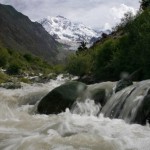– If you think the Failed States Map I offered in my last post looked bad, consider what the Foreign Policy Magazine folks think may happen when the climate changes.
= = = = = = = = = = =
 Hopelessly overcrowded, crippled by poverty, teeming with Islamist militancy, careless with its nukes—it sometimes seems as if Pakistan can’t get any more terrifying. But forget about the Taliban: The country’s troubles today pale compared with what it might face 25 years from now. When it comes to the stability of one of the world’s most volatile regions, it’s the fate of the Himalayan glaciers that should be keeping us awake at night.
Hopelessly overcrowded, crippled by poverty, teeming with Islamist militancy, careless with its nukes—it sometimes seems as if Pakistan can’t get any more terrifying. But forget about the Taliban: The country’s troubles today pale compared with what it might face 25 years from now. When it comes to the stability of one of the world’s most volatile regions, it’s the fate of the Himalayan glaciers that should be keeping us awake at night.
In the mountainous area of Kashmir along and around Pakistan’s contested border with India lies what might become the epicenter of the problem. Since the separation of the two countries 62 years ago, the argument over whether Kashmir belongs to Muslim Pakistan or secular India has never ceased. Since 1998, when both countries tested nuclear weapons, the conflict has taken on the added risk of escalating into cataclysm. Another increasingly important factor will soon heighten the tension: Ninety percent of Pakistan’s agricultural irrigation depends on rivers that originate in Kashmir. “This water issue between India and Pakistan is the key,” Mohammad Yusuf Tarigami, a parliamentarian from Kashmir, told me. “Much more than any other political or religious concern.”
Until now, the two sides had been able to relegate the water issue to the back burner. In 1960, India and Pakistan agreed to divide the six tributaries that form the Indus River. India claimed the three eastern branches, which flow through Punjab. The water in the other three, which pass through Jammu and Kashmir, became Pakistan’s. The countries set a cap on how much land Kashmir could irrigate and agreed to strict regulations on how and where water could be stored. The resulting Indus Waters Treaty has survived three wars and nearly 50 years. It’s often cited as an example of how resource scarcity can lead to cooperation rather than conflict.
But the treaty’s success depends on the maintenance of a status quo that will be disrupted as the world warms. Traditionally, Kashmir’s waters have been naturally regulated by the glaciers in the Himalayas. Precipitation freezes during the coldest months and then melts during the agricultural season. But if global warming continues at its current rate, the Intergovernmental Panel on Climate Change estimates, the glaciers could be mostly gone from the mountains by 2035. Water that once flowed for the planting will flush away in winter floods.
Research by the global NGO ActionAid has found that the effects are already starting to be felt within Kashmir. In the valley, snow rarely falls and almost never sticks. The summertime levels of streams, rivers, springs, and ponds have dropped. In February 2007, melting snow combined with unseasonably heavy rainfall to undermine the mountain slopes; landslides buried the national highway—the region’s only land connection with the rest of India—for 12 days.
Normally, countries control such cyclical water flows with dams, as the United States does with runoff from the Rocky Mountains. For Pakistan, however, that solution is not an option. The best damming sites are in Kashmir, where the Islamabad government has vigorously opposed Indian efforts to tinker with the rivers. The worry is that in times of conflict, India’s leaders could cut back on water supplies or unleash a torrent into the country’s fields. “In a warlike situation, India could use the project like a bomb,” one Kashmiri journalist told me.
Water is already undermining Pakistan’s stability. In recent years, recurring shortages have led to grain shortfalls. In 2008, flour became so scarce it turned into an election issue; the government deployed thousands of troops to guard its wheat stores. As the glaciers melt and the rivers dry, this issue will only become more critical. Pakistan—unstable, facing dramatic drops in water supplies, caged in by India’s vastly superior conventional forces—will be forced to make one of three choices. It can let its people starve. It can cooperate with India in building dams and reservoirs, handing over control of its waters to the country it regards as the enemy. Or it can ramp up support for the insurgency, gambling that violence can bleed India’s resolve without degenerating into full-fledged war. “The idea of ceding territory to India is anathema,” says Sumit Ganguly, a professor of political science at Indiana University. “Suffering, particularly for the elite, is unacceptable. So what’s the other option? Escalate.”
More… ➡
 We hit 103 F in Seattle today which beat the old record, I think by 7 degrees. Here where we live, about 35 miles inland and to the north, we hit 107 F.
We hit 103 F in Seattle today which beat the old record, I think by 7 degrees. Here where we live, about 35 miles inland and to the north, we hit 107 F.